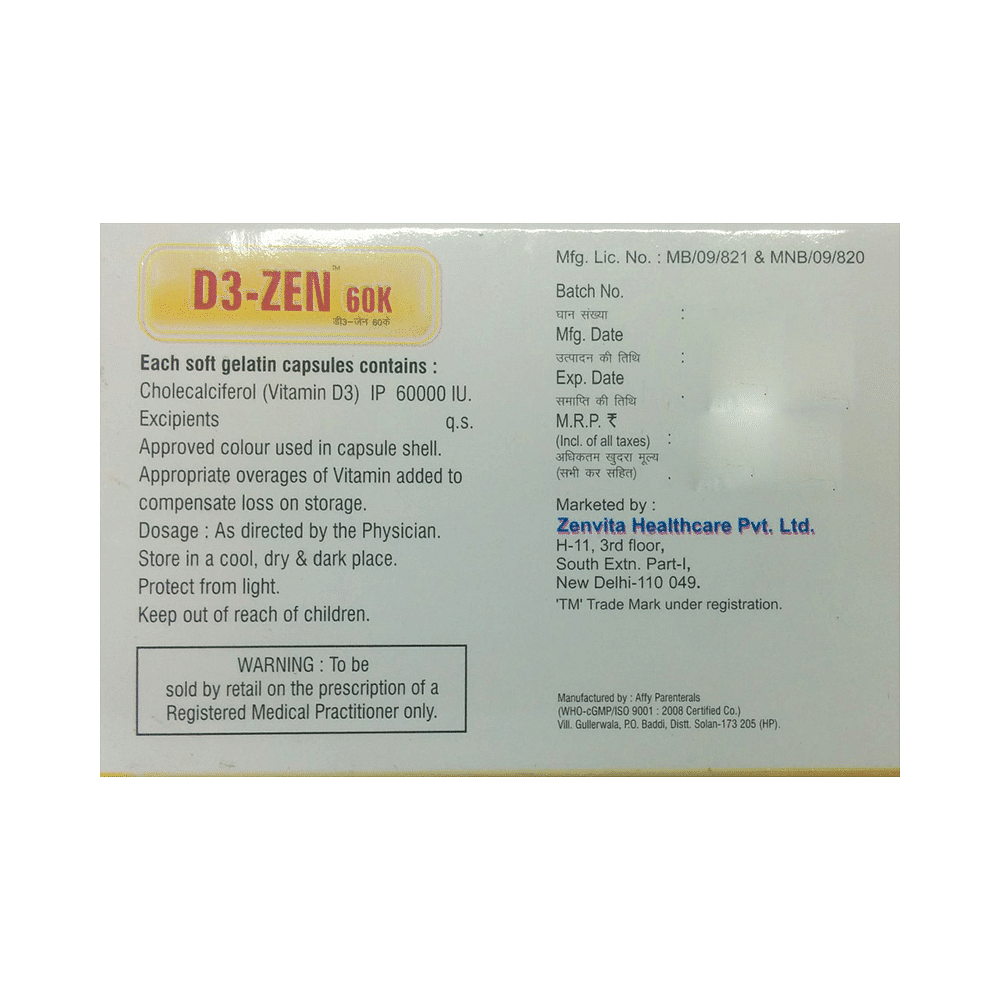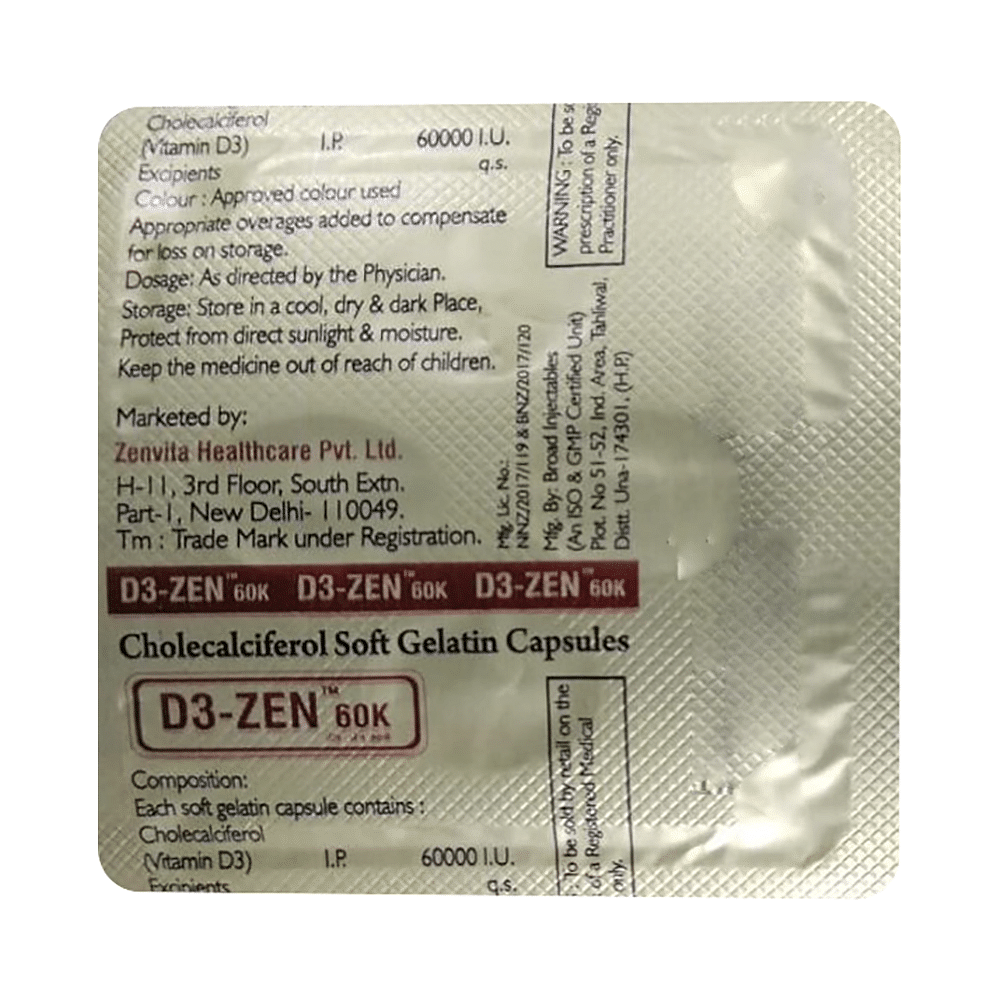


D3-Zen 60K Soft Gelatin Capsule
Manufacturer
Zenvita Healthcare Pvt Ltd
Salt Composition
Vitamin D3 (60000IU)
Key Information
Short Description
D3-Zen 60K Soft Gelatin Capsule is used to treat vitamin D deficiency and osteoporosis by helping the body absorb calcium, essential for maintaining strong and healthy bones.
Dosage Form
Soft Gelatin Capsule
Introduction
D3-Zen 60K Soft Gelatin Capsule should be taken as directed by your doctor. It is best taken with or after food as this helps your body absorb it and you should take it regularly to get the most benefit. If you are using it to treat osteoporosis you will be prescribed other medicines as well. This medicine may be only part of a complete program of treatment that also includes making changes to your diet and taking calcium and vitamin supplements. Learn about the foods you should eat to make sure you get enough calcium and vitamin D in your diet.
Directions for Use
Take this medicine in the dose and duration as advised by your doctor. Swallow it as a whole. Do not chew, crush or break it. D3-Zen 60K Soft Gelatin Capsule is to be taken with food.
How it works
D3-Zen 60K Soft Gelatin Capsule is a form of vitamin D. It raises vitamin D levels in your blood. This in turn raises calcium levels in your blood by helping you absorb more calcium from food.
Quick Tips
Your doctor has prescribed D3-Zen 60K Soft Gelatin Capsule for the treatment of vitamin D3 deficiency. Take it as per dose and duration suggested by your doctor. It should be taken with food for faster absorption of medicine. Some healthy tips for vitamin D deficiency: Get enough sun exposure 10-30 minutes thrice a week. Light-skinned: 20-30 minutes of sun exposure. Dark-skinned: 30-40 minutes of sun exposure. Eat vitamin D rich diet like egg yolk, mushrooms, cheese, milk, butter, fortified food and oily fish. It might affect your sleep pattern when taken at night time. To avoid this better to take it at day time. Do not take antacids or any other medication 2 hours before or after taking D3-Zen 60K Soft Gelatin Capsule. Inform your doctor if you notice nausea, vomiting, poor appetite, constipation, weakness and weight loss while taking this medicine.
Related Medicines

Iodex Balm

Dettol Original Hand Sanitizer

Zandu Fast Pain Relief Ultra Strong Gel

Zandu Balm

Cret-Low Tablet

Deksel Neo Oral Solution

Noorani Oil

Sobitab 1000 Tablet

Basil No Tick Preventive Herbal Shampoo

Temcal 0.25mcg Soft Gelatin Capsule
Frequently asked questions
What is the best time to take D3-Zen 60K Soft Gelatin Capsule?
You can take D3-Zen 60K Soft Gelatin Capsule at any time of day, as it does not have a specific optimal timing. However, consider taking it with your main meal for enhanced absorption.
What are the benefits of taking D3-Zen 60K Soft Gelatin Capsule?
D3-Zen 60K Soft Gelatin Capsule supports bone health, immune system function, brain and nervous system well-being, regulates insulin levels, and promotes heart and blood vessel health.
How should I take D3-Zen 60K Soft Gelatin Capsule?
Take the capsule whole with water, without crushing or chewing it. Taking it with your main meal may help improve absorption.
Who should avoid taking D3-Zen 60K Soft Gelatin Capsule?
Do not take this supplement if you have an allergy to cholecalciferol, excessive calcium in the blood or urine, kidney stones, or severe kidney issues.
What are the consequences of taking too much D3-Zen 60K Soft Gelatin Capsule?
Taking high doses for a prolonged period may lead to hypercalcemia, causing symptoms like weakness, fatigue, vomiting, diarrhea, sluggishness, kidney stones, increased blood pressure, and growth retardation in children.
How much vitamin D should I take daily?
Daily requirements vary; consider supplementing with 1000-3000 IU/day of vitamin D if your diet is not meeting the daily requirement. D3-Zen 60K Soft Gelatin Capsule serves as a supplement for patients with vitamin D deficiency.
What happens when vitamin D levels are low?
Low levels may cause rickets in children and osteomalacia in adults, increasing risks of diabetes mellitus type 1, high blood pressure, depression, certain cancers, and osteoporosis.


